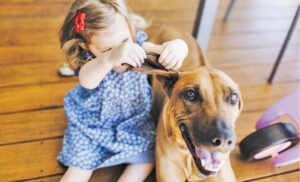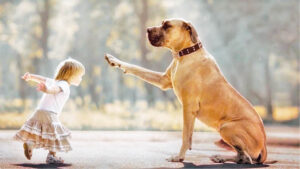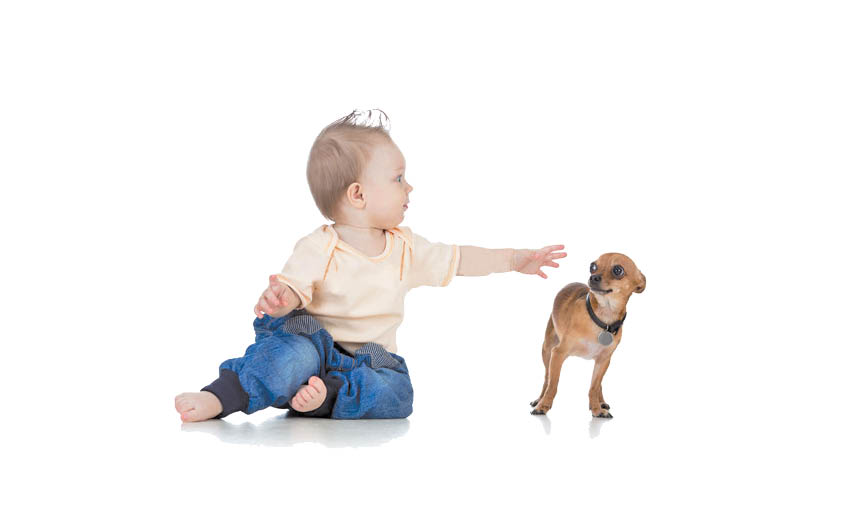Every year, a number of children fall victim to dog-bites. In virtually every such case, it is neither the dog nor the child that is at fault – it’s the lack of communication and awareness to blame. Understanding the ‘Why’s, If’s and How’s’ of dog-bites helps us avoid adding to the dog-bite statistic.
 Why Do Dogs Bite?
Why Do Dogs Bite?
We need to understand that all dogs are intrinsically wired to bite for self-protection. To prevent getting bitten, we need to understand more about canine rules and behaviour. In the doggy world, biting is in their nature – they express themselves through barks, growls, snarls, snaps and bites. When one dog bites another, there is no offence taken by either! It’s how they resolve their issues!
By nature, dogs, like other animals, are ‘flight’, not ‘fight’ animals. This means that when faced with a threat or anything unpleasant, a dog will choose to flee rather than stand and fight. Most dogs are friendly, but even friendly dogs can sometimes become scared or angry. Many dogs bite if they think it is the only way out of a problem. Understanding how dogs think can help you make friends without getting hurt. Studies show that a dog will bite when it feels threatened or afraid; gets excited, even in play; when the dog doesn’t know you; when its ‘chase instinct’ is triggered; when it’s cornered, or is in pain; or when it is guarding its territory – like food, toys, family, or when it’s protective instinct kicks in for a family member or its pups.
Signs Of An Aggressive Dog
Before a dig bites or attacks, there will be a definite change in his body language. Few dogs bite without giving some indication beforehand. The most popular misconception here is a wagging tail – an aggressive dog will also wag his tail, but in a stiff upright manner. Other signs to watch out for include: A stiff body posture in the dog; A low growl; Raised hackles (the fur on the back of his neck); A fixed stare at the threatening object; Raised upper lip, showing teeth; and when a dog is backing away from you.
 Timely Prevention Of Dog Bites: Tips to avoid getting bitten by a dog:
Timely Prevention Of Dog Bites: Tips to avoid getting bitten by a dog:
- Don’t disturb a dog when it’s sleeping, eating, gnawing on a bone or if it’s caring for puppies. Dogs are known to behave defensively in these circumstances.
- Play safe games, like fetch, hide and seek etc., with your pet. Avoid games where your dog chases you, jumps on you or nips at you. Play gently and calmly. If your dog gets too excited, stop the game immediately and walk away. Take some time out to give you both a chance to calm down.
- Do not try to help a dog that is in pain or is hurt, even if it is your own dog. Get an adult to attend to the animal. A dog in pain doesn’t understand where the pain comes from. If you touch him, he may think you are causing the pain and may bite you to stop the pain.
- Always ask for permission before petting a strange dog. If the owner isn’t there, leave the dog alone. Not all dogs are friendly or like children. If a dog thinks you’re a stranger who might hurt him, he may not know how to get away and he may resort to biting to protect himself.
- Don’t go up to a dog that is tied up; don’t reach through a car window or fence to pet a dog – you could get your fingers bitten off.
- When interacting with a strange dog, extend your hand with your fist gently balled up – this prevents your fingers from getting snapped at. Let the dog sniff the hand before you slowly pet him on the side of the neck. Avoid patting a strange dog on the top of his head. Dogs view that as a threatening gesture.
- Avoid hugging a dog that is unknown to you. Dogs are not primates and view hugging as a threatening gesture – not an affectionate one, unless they are taught so.
- When giving a treat to a dog, place it on your open palm. Don’t jerk your hand away at the last moment, as it will cause the dog to snatch at the treat and bite you by mistake.
- Live and let live. Don’t tease, abuse or harass stray dogs.
What To Do If You’re Being Threatened By A Dog:
- When faced with an aggressive dog, here’s what you can do to minimize the risk of getting bitten:
- Don’t stare into its eyes. Avert your gaze, looking towards the ground, while keeping an eye on the dog.
- Stay calm. Don’t flail your arms, scream or shout. You could further incite the dog.
- Don’t try to run. Children especially tend to scream, run wildly and flail their arms. This tends to bring out the chase instinct in a dog, which can make things worse. This is why kids get bitten more than adults.
- If the dog jumps on you and knocks you over, roll into a ball with your hands over your head and neck. Protect your face and lie very still.
- If you have a bag, a book, anything, hold it in front of you to protect yourself. If the dog attacks, push it into his mouth.
- Try to stay still until the dog leaves, or back away slowly until the dog is out of sight. Walk in a slow but confident manner.
- Avoid talking to the dog or threatening it.
- Don’t throw anything at the dog or hit him.
- If you are being chased by strays while on your bike, or walking alone, a quick and effective way to ward them off is to carry a bottle of water and splash it onto them.
If You Get Bitten… Immediately wash the wound with soap and warm water. Get to a doctor and report the bite to the owner of the dog. In case a stray dog bites you, note down the type, size and colour of the animal. Was it wearing a collar? Did it have any identification tags? Where were you when you were bitten? Where did the animal go? Keep a watch on the animal for a period of two weeks for any signs of rabies. Report this dog to any NGO in charge of stray dogs in the area.
Dogs often bite children because young kids don’t recognize when they may be in trouble, especially small children don’t recognize a warning when they see or hear one. A child under six years of age doesn’t know what a growl means. Avoid leaving a young child alone with a dog for even a minute. It is up to you – the adult, to keep a child safe from a dog and a dog safe from children.
- The Secret Life Of Dogs: What’s Your Doggie Really Thinking? - 15 March2025
- Cracking The Canine Contentment Code: What Makes Dogs Happy - 10 August2024
- The Dark Side Of Pampered Pets: Is Your Kindness Harming Your Dog? - 16 March2024
